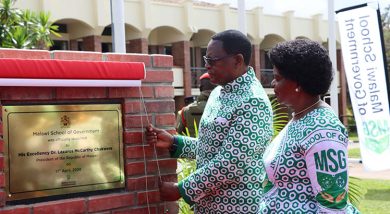LCC unveils waste management facilities
Ambassador of the European Union (EU) Delegation to Malawi Marchel Gerrmann has commended Water Aid and Lilongwe City Council (LCC) for the construction of two waste management centre facilities in Lilongwe.
Gerrmann made the commendation during the launch of the waste management facilities at Masintha Ground in the city on Tuesday.
The construction of the facilities is part of a programme designed to contribute to national efforts to achieve MDG7 for water and sanitation which EU is financing in Malawi since 2006.

“We are now in 2017 and although strides have been made, the health risks in our communities remain. One of the most challenging targets of Sustainable Development Goals (SDGs) is to substantially reduce waste generation through prevention, reduction, recycling and reuse by 2030.
“The waste transfer stations unveiled today will be opening business opportunities and generating income for local entrepreneurs, who will now be managing waste in safer and controlled ways,” said the ambassador.
He has since appealed to the Malawi Government and local communities to prove that the infrastructure can be maintained.
Lilongwe City mayor Desmond Bikoko thanked EU and Water Aid for financing the project.
“The city has a population of over 700 000, making it the fastest growing city in the country. With this growing population, the amount of solid waste generated is also growing.
“Almost 350 tonnes of waste is generated everyday but not all of it is collected and treated in ideal landfill. The facilities we are launching today will directly benefit over 100 000 people in Kawale, Biwi, Chilinde, Area 13 Market and City Centre,” said Bikoko.
Water Aid country director Mercy Masoo said the facilities will make solid waste collection more efficient and reduce overall transportation costs.
Solid waste transfer stations are facilities where solid waste is unloaded from collection vehicles or containers for treating and recycling before final disposal.
At these facilities, workers will screen incoming waste to recover recyclables or materials inappropriate for disposal at a solid waste landfill such as large appliances, tyres and automobile batteries, among other wastes. n





